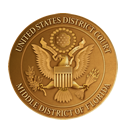(a) PURPOSE. These rules advance efficiency, consistency, convenience, and other interests of justice.
(b) SUSPENDING THE APPLICATION OF A RULE. If reasonably necessary to achieve the purpose of these rules, a judge can temporarily modify or suspend the application of any rule, except Local Rule 1.05(a).
(c) ELECTRONIC FILING. By administrative order, the court can prescribe procedures governing electronic filing.
(d) DEFINITIONS.
(1) "Action" means, collectively, the claims a party asserts in a pleading.
(2) "Bar" means the bar of the Middle District.
(3) "Case" means the content of the docket in an action (for example, if remand occurs, the action returns to state court, but the case remains in federal court).
(4) "Claim" or "claim for relief" means the basis for relief a party asserts in a count of a pleading and is similar to the state court term "cause of action."
(5) "Clerk" means the Clerk of the Court for the Middle District or the clerk's designee.
(6) "Court" means the judges of the Middle District collectively.
(7) "Judge" means a presiding judge.
(8) "Lawyer" means a member of the Middle District bar or a lawyer specially admitted in the Middle District.
(9) "Lead counsel" means the lawyer responsible to the court and the other parties for the conduct of the action, including scheduling.
(10) "Legal memorandum" means a paper — including a legal brief — that cites legal authority or otherwise advances a statement of law to support a request for relief.
(11) "Middle District" means the United States District Court for the Middle District of Florida.
(12) "Paper" means a pleading, motion, document, exhibit, attachment, appendix, photograph, or other filing susceptible to appearance on the electronic docket and not a tangible object.
(13) "Person" means a natural person or an entity the law recognizes as a person.
(14) "Pleading" means a paper identified as a pleading and permitted under the Federal Rules of Civil Procedure.
(15) "Pro se" means not represented by a lawyer.
